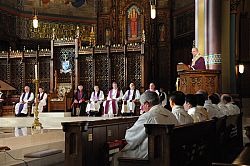Diocese hosts regional canon law convention

SALT LAKE CITY — Judicial vicars and others involved in matters of Church law gathered March 10-12 at the Radisson Hotel in Salt Lake City for the annual Western Canon Law Society of America Regional Convention. "The purpose of the conference is to gather all the people that work for the tribunals in this region, not only the judicial vicars and the adjuncts and the advocates, but also the staff – people that work very close to us – in order to discuss certain current issues of canon law and determine certain actions that help us be more effective in the work that we do," said Father Langes Silva, judicial vicar for the Diocese of Salt Lake City, who hosted the convention. The convention topics change each year, although usually one workshop is devoted to issues of marriage "because that is the topic that most people work on every day in the tribunals," Fr. Silva said. This year, the primary topic was Graviora Delicta, grave crimes against Church law. The presenter, Monsignor Patrick R. Lagges, a presbyter of the Archdiocese of Chicago who serves as Catholic chaplain at the University of Chicago and the director of the Hesburgh Sabbatical Program at Catholic Theological Union, focused on the clergy sex abuse scandal. Msgr. Lagges chose the topic because "these issues are continuing to develop," with direction coming from Rome on the matter, and there are things that those attending the conference can do in their own diocese in this regard, he said. Another topic at the conference was The Church of Jesus Christ of Latter-day Saints. Dr. Gary Topping, a historian who now serves as the Diocese of Salt Lake City archivist, gave a historical perspective of Mormonism. Dr. David Clark Knowlton, a sociocultural anthropologist who specializes in Mormonism, and James Jardine, a local attorney who is Chair of The LDS Church’s Public Affairs Council of the Utah Salt Lake City Area, also presented. Fr. Silva then spoke about the canonical applications of marriage between people of the two faiths; his doctoral dissertation was in this area. This topic was particularly of interest to Piedad Gonzalez, the secretary for the Diocese of Reno tribunal, because she didn’t know much about it, she said, adding that for her the convention is primarily a place to talk to others about how they handle tribunal matters. "That social networking is very good for me," she said. Father Andy Ligot, judicial vicar for the Diocese of San Jose, agreed. He has attended the conference every year since he began as judicial vicar, and "first and foremost it’s an occasion to share one’s experiences with fellow participants. I think that’s one of the best things in the convention. … This is the only time where we actually meet and have time." For the conference, Mass was celebrated in the Cathedral of the Madeleine, with Sulpician Father Phillip J. Brown presiding. Fr. Brown is president of the Canon Law Society of America. Concelebrating were Chorbishop William J. Leser, a former parish administrator of Saint Jude Parish in Murray and the judicial vicar of the Maronite Eparchy of Our Lady of Lebanon; Auxiliary Bishop Edward Clark of the Archdiocese of Los Angeles; Monsignor Robert Servatius, pastor of Blessed Sacrament Parish; Monsignor Robert Mayo, pastor of Saint John the Baptist Parish; Father Martin Diaz, pastor of the Cathedral of the Madeleine; other priests of the diocese and those who attended the convention. In his homily, Fr. Brown said that broken marriages yield broken hearts, and broken relationships crush spirits. "Are we doing all we can to understand why relationships fail?" he asked. Canonists have a "serious ministry with far-reaching consequences, whether they be penal law or marriage cases we are called to do justice in due course and with due consideration but also expeditiously so that justice will not be denied."
© Copyright 2024 The Diocese of Salt Lake City. All rights reserved.

Stay Connected With Us